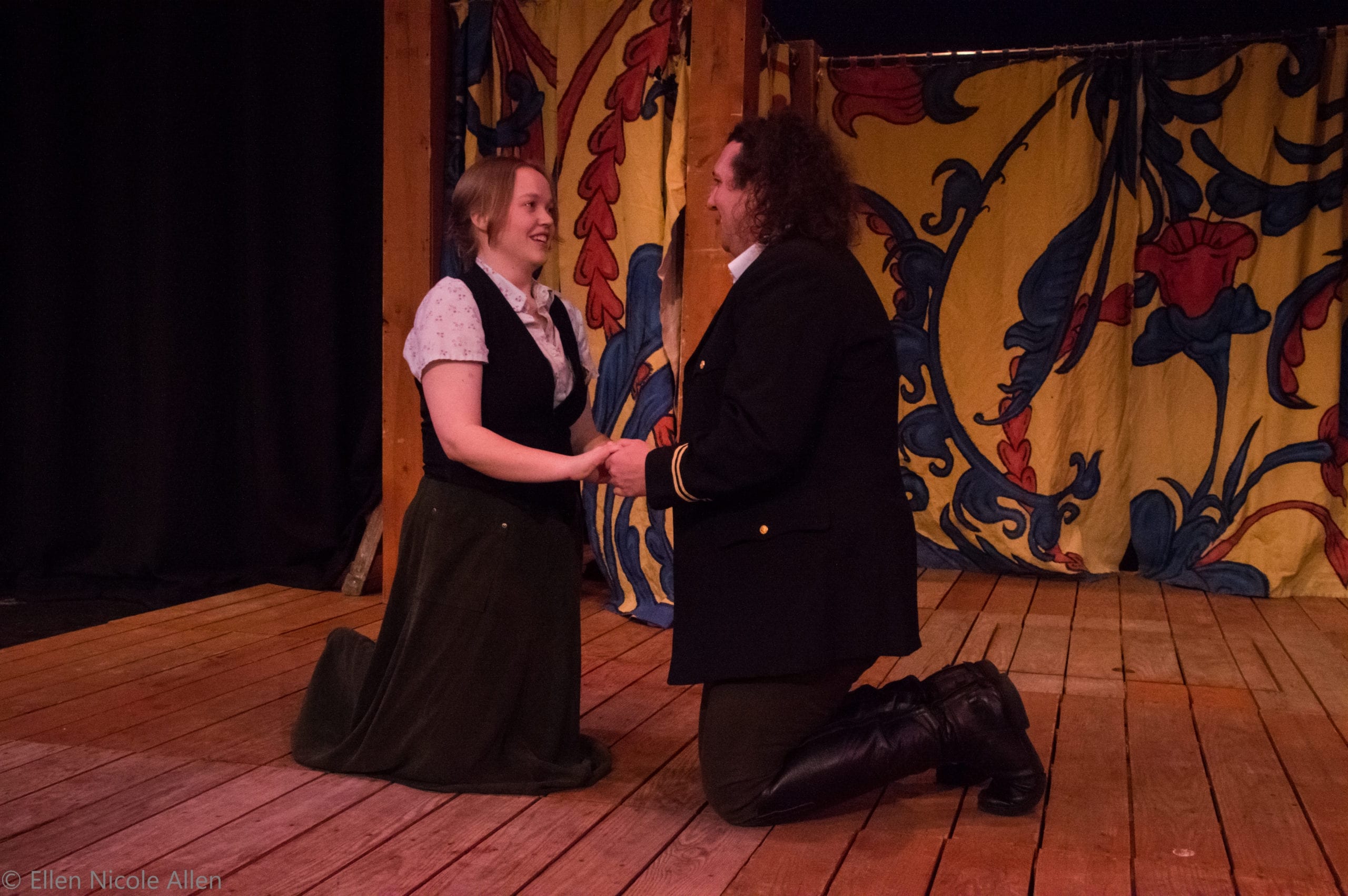OREM — The original romantic comedy, Much Ado About Nothing, is on stage in a marvelous production that deserves a much longer run. Hosted by the SCERA and staged by the Grassroots Shakespeare Company, this production of Shakespeare‘s comedy is loaded with laughs, but still has plenty of emotion.

At the end of a war, the troops return to Messina, led by their prince, Don Pedro (played by Ardon Smith). Among them are Benedick (played by Tyler Harris) and Claudio (played by Brandon Bills). The latter is in love with Hero (played by Emma Robinson), the daughter of Leonato (played by Dan Anderson). Benedick, though, has an antagonistic relationship with Beatrice (played by Jessamyn Svensson), who is Hero’s cousin. In true romantic comedy fashion, Beatrice and Benedick’s friends conspire to get the two of them to admit their hidden feelings for one another.
Grassroots Shakespeare productions are all director-less, and thus depend on the ability of their cast to work together to create a unified vision. This was most apparent in the acting style. The entire cast eschewed naturalism and instead chose an acting style where they ignored the fourth wall and emphasized the humor. But instead of actors mugging towards the audience and shooting for cheap laughs, the entire cast played characters who were aware of the audience. This subtle distinction added depth to the characterizations and made the lines delivered to an audience not feel like a comedy routine.

Svensson gives Beatrice a rough edge, especially when she expressed her disdain for men. The moment where she rejects Don Pedro as a suitor was particularly effective in showing the Beatrice’s cruel tongue. Harris ensured that Benedick had “some odd quirks,” especially when Harris enthusiastically played the fool in love when Benedick thought that Beatrice had feelings for him. Harris and Svensson were adept with the language of Shakespeare’s script, and they traded barbed insults with ease. What they lack in sexual chemistry, they make up for with a comfortable familiarity that supported the budding relationship between Beatrice and Benedick. I most appreciated, though, the way Svensson and Harris showed their characters’ vulnerability after Claudio rejects Hero. This added heart and emotional depth to a production that was otherwise full of riotous laughter.
As Claudio and Hero, Bills and Robinson are the more traditional romantic couple. Both actors have an undeniable charisma, and their interactions were full of tenderness and mutual care. Bills demonstrated the greatest emotional range in his performance, which included the extremes of irrational giddiness (when Claudio was in love), outrage (at the first wedding), and profound despair (when he thought Hero was dead). Robinson was charming in all her scenes, especially when Hero eagerly agreed to get married to Claudio. Robinson also had a knack for acknowledging the audience silently with a chaste but flirtatious look, which separated Hero from the other female characters, who were all less interested in romance.

Smith also caught my attention as the authoritative, dignified Don Pedro. His commanding voice and dignified bearing were suited for the role of a prince. Moreover, Smith gave Don Pedro an affable familiarity with Bendick and Claudio, which made it natural for the character to get involved with the personal lives of his officers. As Don John, Soren Budge was unceasingly sinister, which was suitable for a villain. Unfortunately, the choice to wear a Dracula cape distracted me from his performance.
That misstep in Budge’s costume was rare in this production, though. In Much Ado About Nothing, the cast has found almost the perfect balance between the Grassroots hodgepodge costuming aesthetic and the need for unity among the characters. I especially enjoyed the military coats for Don Pedro, Claudio, and Benedick, which were all the same cut and coordinated to have the needed military appearance. Likewise, the matching funeral veils for Hero, Beatrice, and Margaret (the latter played by Emma Truax) were a lovely touch that added to the solemnity of the scene.
There were a few things I would have done differently if I were in charge of this production. But these are merely differences in artistic preferences, not things that Grassroots has done wrong in creating this show. Indeed, the biggest problem with Much Ado About Nothing is that the run is only five performances. This monstrously funny production deserves a much longer run. Alas, with the last performance on Saturday, there are too few opportunities to laugh “at such shallow follies in others.” So, catch Much Ado About Nothing while you can.
[box]The Grassroots Shakespeare Company production of Much Ado About Nothing plays nightly at 7:30 PM through January 19 at the SCERA Center for the Arts (745 South State Street, Orem). Tickets are $10-12. For more information, visit scera.org or grassrootsshakespeare.com.
Update: Grassroots Shakespeare Company has extended the run of this production of Much Ado About Nothing by adding performances on February 14 and 15 at the Gothic Room in the Salt Lake Masonic Temple (650 East South Temple, Salt Lake City). Tickets are $15.[/box]
